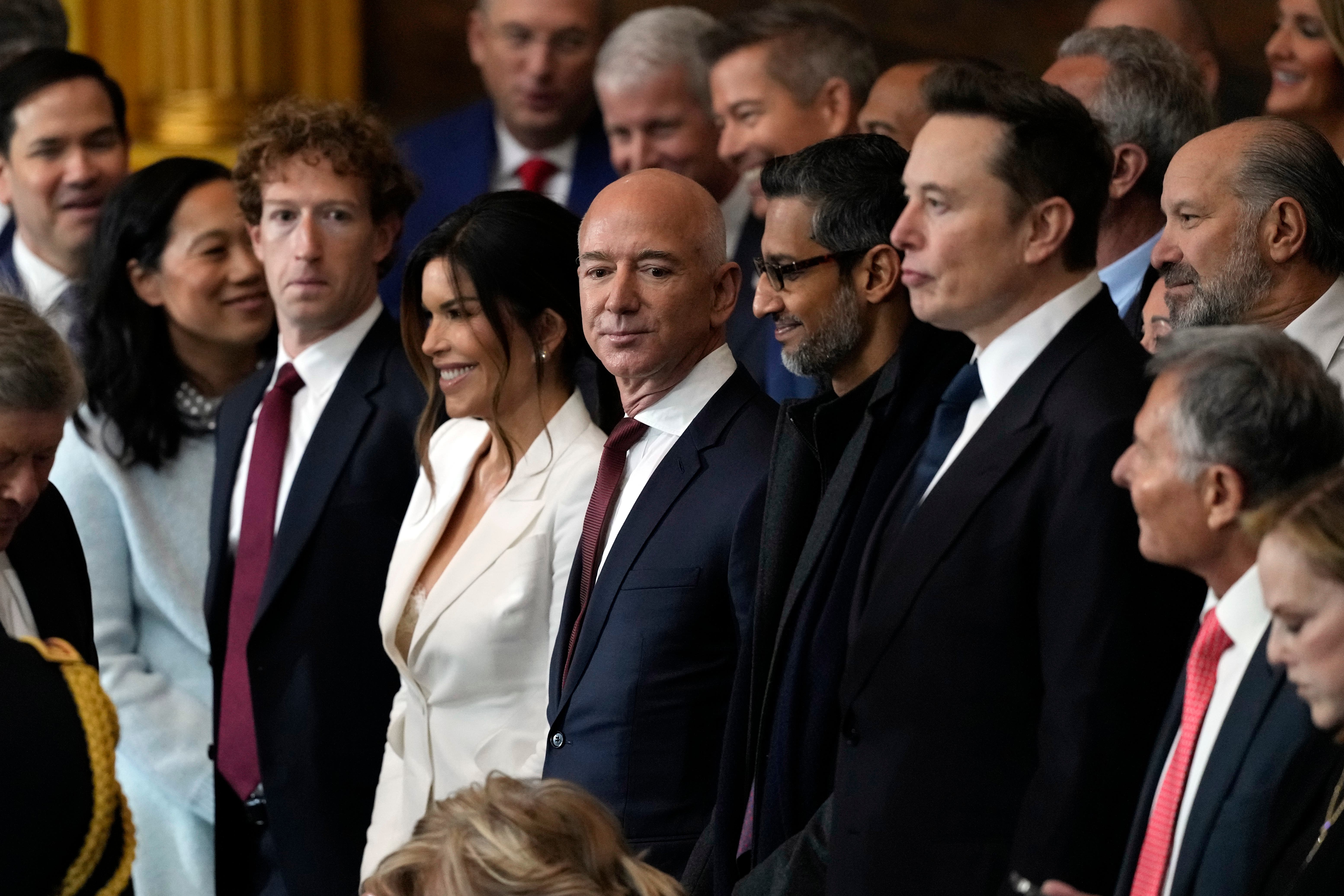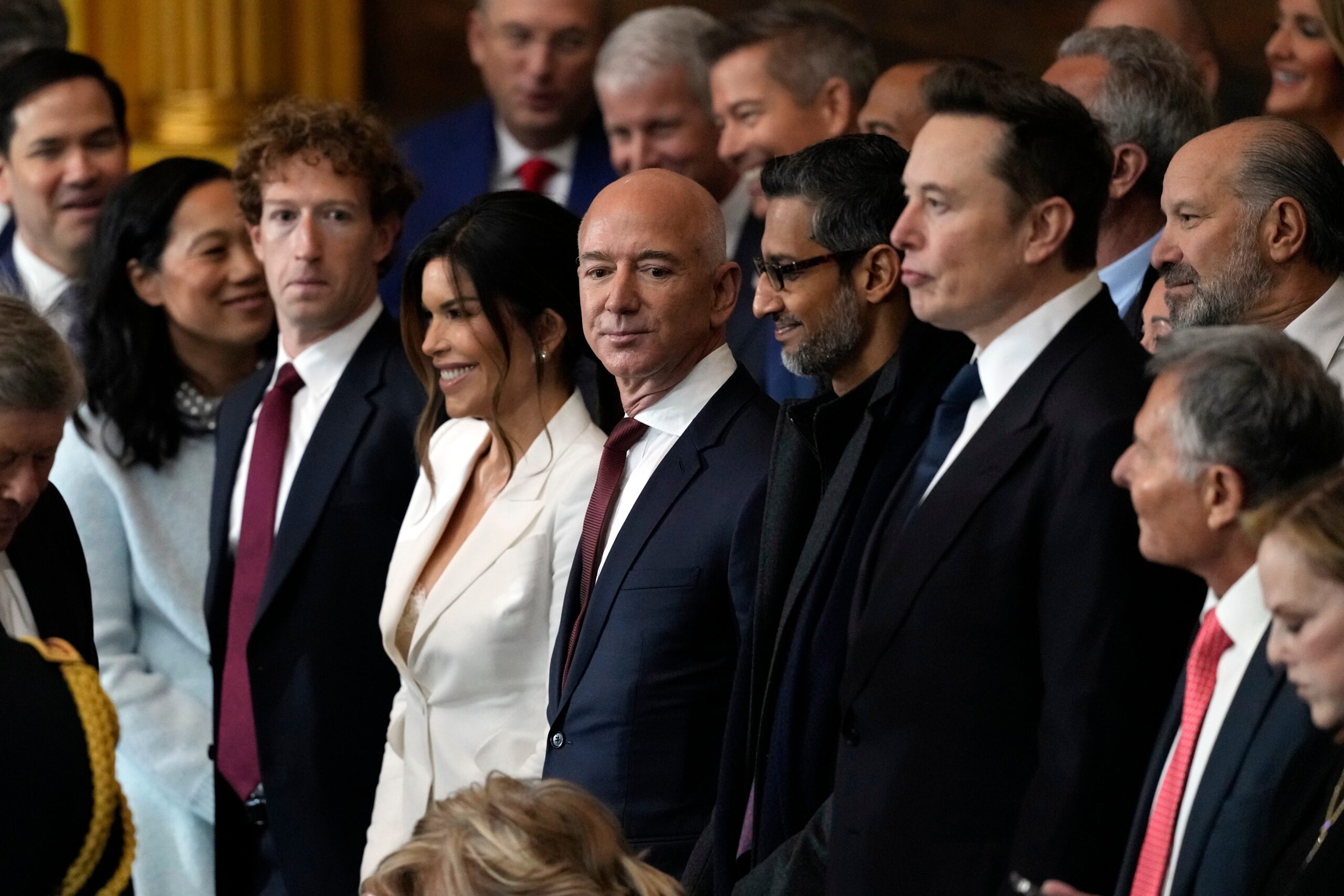Tech billionaires whose companies donated millions of dollars to Donald Trump lost billions of dollars on Thursday, as the stock market plunged in reaction to his sweeping “Liberation Day” agenda of worldwide tariffs.
As of 6:30pm Eastern time, Meta stock was down 8.96 percent, Amazon was down 8.98 percent, Google had fallen 3.92 percent, while Apple had plunged over 9 percent.
White House adviser Elon Musk’s marquee companies also felt the pain, with Tesla sliding 5.47 percent and X down 8.14 percent.
As a result of the sell-off, Meta’s Mark Zuckerberg personally lost $17.9 billion, while Amazon founder Jeff Bezos’s wealth declined $16 billion and Musk was down $8.7 billion, according to an analysis from Forbes.
All told, the market plunge wiped away $208 billion from the world’s richest 500 people, per the Bloomberg Billionaire’s Index, the fourth largest one-day decline in the tracker’s 13-year history.
Treasury Secretary Scott Bessent said Wednesday a market decline was a sign of investors correcting for months of AI hype and over-priced tech stocks, calling it a “Mag 7 problem, not a MAGA problem,” a reference to the “Magnificent Seven” tech stocks Apple, Amazon, Tesla, Alphabet, Microsoft, Meta and chip-maker Nvidia.

Throughout the 2024 election season, Trump courted an unusual level of support from Big Tech for a hard-right Republican.
During the campaign, Elon Musk donated more than $290 million to Trump and Republican-affiliated efforts. Meta and Amazon both gave $1 million to Trump’s inauguration, while Apple’s Tim Cook personally donated another million.
Ahead of Trump taking office, tech CEOs expressed optimism Trump might slash regulation and support the burgeoning artificial intelligence field, where U.S. companies are in an arms race with China.
“I am very optimistic that President Trump is serious about this regulatory agenda,” Bezos said in December. “If I can help him do that, I’m going to help him, because we do have too much regulation in this country.”
“I think there’s a real opportunity in this moment,” Google’s Sundar Pichai added that month. “One of the constraints for A.I. could be the infrastructure we have in this country, including energy. The rate at which we can build things. I think there are real areas where I think he’s thinking about and committed to making a difference. So hopefully we can make progress there.”
Other companies appeared to court the Trump administration with preemptive policy changes, like Meta, which rolled back diversity and content-moderation policies, while appointing Trump ally and UFC president Dana White to its board.
The administration has been a mixed bag since for these tech firms.
Vice President JD Vance, himself a former tech venture capitalist, has been outspoken against what he sees as European regulator overreach against U.S. tech companies.
“The Trump administration is troubled by reports that some foreign governments are considering tightening the screws on U.S. tech companies with international footprints,” he said at a conference in February. “Now America cannot and will not accept that.”
Meta’s Zuckerberg has reportedly been lobbying Trump for assistance heading off a potential effort from regulators to force Facebook to allow European users to access its Facebook and Instagram platforms without facing personalized ads, which could be a major hit to the firm’s business model.
The White House has also thrown its support behind a joint OpenAI-Oracle-SoftBank venture called Stargate, which intends to invest up to $500 billion in U.S. AI infrastructure.
At the same time, if the market continues to tank, and if, as some firms predicts, a recession arrives within the next 12 months, it could have a major impact on U.S. AI capabilities.
Developing AI requires data centers that use huge amounts of electricity, so much so that major tech firms have been on a spree of signing nuclear power agreements in recent months to secure long-term energy supplies.
However, given the capital-intensive, multi-year nature of electricity generation projects, the tariff chaos could stall further long-term investments in the kind of infrastructure tech firms need to keep making AI.
Source: independent.co.uk



